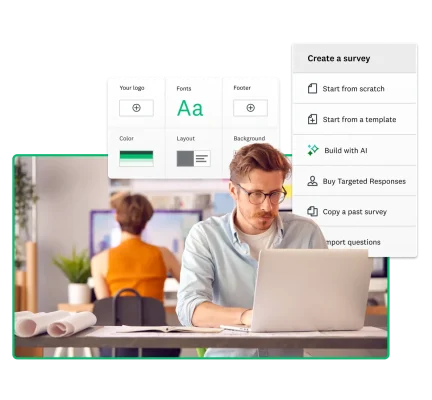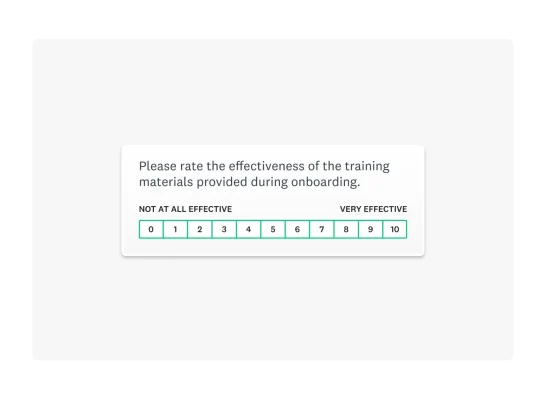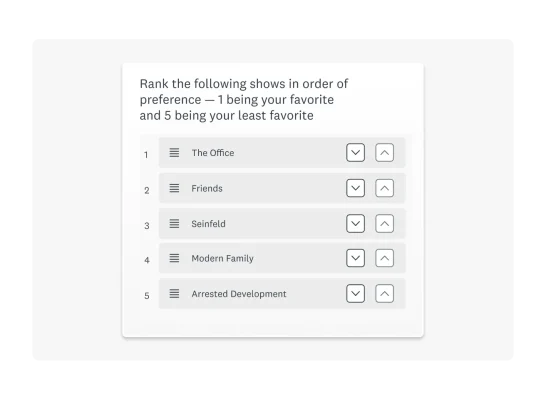How to make a quiz for free
Discover how the SurveyMonkey interactive quiz maker works, or leverage a template to rapidly make a quiz and send it out for free.

- To design an online quiz, choose the right questions and answers, set scoring rules, and share the quiz strategically.
- Online quizzes can be categorized into training evaluations, skills and competency tests, academic assessments, and trivia or game quizzes. Each is tailored to specific objectives like learning, skill validation, or entertainment.
- To write good quiz questions, ensure they are clear, concise, aligned with the quiz objectives, and offer plausible answer choices to assess knowledge or understanding effectively.
If you’re looking for a quick and easy way to make an online quiz for free, you’ve come to the right place. SurveyMonkey has a free online quiz maker that you can use to create, customize, deliver, and collect quiz responses.
Here’s our quick-start guide to creating a quiz in SurveyMonkey and getting the most from your quiz. We’ll offer insight into how to create a quiz, what makes a quiz effective, how to send a quiz, and examples of different quiz questions.
How to make a quiz using SurveyMonkey
Making an online quiz is easier than ever with SurveyMonkey. Our online quiz maker helps you create quizzes, distribute them, and collect their results in minutes.
Here’s how our quiz maker works:
- Create a free SurveyMonkey account or log in and choose one of our online quiz templates. You could also select “Start from scratch” if you have a particular quiz in mind.
- Use Build to add quiz questions to your survey.
- Enable “Score this question (enable quiz mode)” for each question.
- Next, assign your answer option points using the plus or minus signs.
- Distribute your quiz via email, social media, weblink, and mobile chat.
Turn a survey into a quiz
If you're more familiar with creating surveys, you can use this option to create a quiz as well. First, sign up for a free SurveyMonkey account or directly log in to an existing account. From there, choose Create survey, then Start from scratch. Next, you can add questions to your survey with the Build button, entering any text you want to include.
If you’re unsure what to ask in your quiz, use our Question Bank of pre-written questions.
Use a pre-existing SurveyMonkey quiz template
If you’re unsure what to include on your quiz, you can always use one of the SurveyMonkey online quiz templates to streamline the process. From the header menu, choose Create survey, then Start from template. You’ll see a drop-down menu where you can select Forms to look through our entire collection.
Once you’ve found a quiz template you love, select Use this template.
What types of quizzes are there?
You can create a quiz on absolutely anything. Some people use quizzes to test their employees, like with the corporate legal training quiz. Others use quizzes for fun, gathering friends together and using a movie and TV viewing survey to see what everyone’s watching.
Let’s explore some of the types of quizzes that you may decide to use.
Training evaluations or quizzes

When new hires are onboarded to their role, they be tasked with several online training courses to get up to speed on company procedures and other areas related to their role. But how many companies take a moment to gauge how the new hire is feeling in the process, and if they feel prepared to jump into their new job? With an onboarding survey template, you can do just that. The results can help you make necessary adjustments to provide the best onboarding experience.
After finishing an educational module, you can use training evaluation quizzes to see if employees can recall important points from your training. This strategy helps streamline employee onboarding training, as you know exactly where an employee’s knowledge level rests after a training module. That way, you can help those who need it by providing additional support.
You can also use surveys to give employees the opportunity to provide feedback on their training experiences. In the Training Course Evaluation Survey Template, you’ll see questions like, “How likely is it that you would recommend this training session to a colleague?” Over time, requesting and implementing feedback will help improve the training you offer employees.
With SurveyMonkey, ORA Systems was able to move 82 different training courses onto one system that all employees could access. SurveyMonkey’s centralized data platforms made it a breeze for the company to revamp its training program and get the analytical insight it needed to better understand its employees.
Testing skills and competency
Testing is also a useful form of quiz that many people are highly familiar with. Businesses can use quizzes to screen job candidates or even test current employees to assess their knowledge of a specific topic related to their jobs.
Organizations could use the Candidate Evaluation Form Template to consolidate candidate profiles and see which would be the best fit for their company. Questions like “How would you rate your communication skills on a scale of 1-5?” can shed light on which candidates you should take to the interview portion.
Because of how quick quizzes are to fill out, they make a wonderful and accessible part of candidate recruiting and current employee testing.
Online education or academics
Educational or academic quizzes are a form of quiz that many people have years of experience with. Professors and teachers can use quizzes to easily see whether or not students have understood the material or completed the required reading for a class.
Especially considering the major shift toward online education over the past few years, the ease of distribution that online quizzes offer has become extremely important. Teachers can also enable a feature that shows people their scores, allowing students to understand what they got right or wrong.
SurveyMonkey offers a host of educational surveys and quizzes that academic institutions can use to gain the insight they need for data-driven success.
Just for fun: Trivia or game quizzes

Another common use of online quizzes is for fun. Whether you want to quiz your friends, family, or even your colleagues, there are numerous game quizzes you could use. Survey people on their knowledge of pop culture, sports, and current events, or even host your trivia night.
Fun quizzes are more than just a game, they're a powerful tool for team building. They encourage participation, streamline team bonding, and build rapport among groups of people. By using quiz analytics, you can see which individual or team performed the best, fostering a sense of collective achievement and camaraderie.
Writing good questions for quizzes
Engaging quizzes start with effective questions. When writing a good quiz question, you should follow these guidelines:
- Keep it simple: No one wants to read long-winded quiz questions. Keep your writing concise and to the point. Shorter questions will also help reduce ambiguity in your questions, leading to higher response rates.
- Use a diverse selection of answers: You should aim to include an answer for everyone in a quiz. Giving a wide selection of potential answers will ensure that people find the answer they want to respond to instead of settling for a close enough answer.
- Avoid leading and loaded questions: Leading and loaded questions push quiz answerers to respond a certain way. This approach will ruin the authenticity of your quiz and skew your results.
- Include a question counter: People may tire of answering your quiz questions if they don’t know how much longer they’ll spend on your quiz. Alongside your questions, include a counter to show their progress through the overall span of the quiz.
If you’re looking for a more comprehensive guide to writing quiz questions, watch our webinar on survey question design for our full insight.
Online quizzes: Tips and best practices
Sending out your quizzes online helps to improve accessibility, leading to more responses and more accurate final results.
Here are some of our best practices for online quizzes, including tips for boosting response rates and improving the quality of your data.
Use screening questions for accurate scoring
Screening questions are pre-quiz questions that help determine whether or not a quiz responder is a good fit. If you’re interested in surveying a certain group of people, screening questions will ensure that only the right people can take the quiz.
There are two main types of quiz screening questions that you can use: behavioral screeners and industry-specific screeners. The former relates to people’s behavior, like asking someone, “How many hours do you spend reading books a week?” before a quiz about reading habits. If someone answered zero, they wouldn’t be a good fit and couldn’t take the survey.
An industry-specific screener will ask someone what role or industry they’re in. For example, if your organization is running a quiz on customer service skills, you won’t need employees with no customer contact to take the quiz. A screener question will help filter out people to whom the quiz doesn’t apply.
Using screeners will ensure that your final data is as accurate as possible while not wasting anyone’s time with irrelevant quizzes.
Related reading: 5 tips for using screening questions in your survey.
Choose the right quiz question types
The best quizzes are supported by the right question types. Certain quizzes will favor different types of quiz questions. For example, an academic quiz might work well with questions that have multiple-choice answers. But, if you’re assessing employee skills, allowing them to respond to a question using the Likert scale might be the best option.
A useful method for determining the right quiz question type is to consider the result you want to achieve. Some quizzes will show the correct answers to the quiz takers, while others will only generate data for your company to use.
Related reading: Survey question types: examples and tips.
Show respondents their score right away
Most respondents don’t want to wait around for quiz answers. If they’ve taken their time to answer a quiz, respondents will want to see their results as soon as possible. With SurveyMonkey quizzes, you’re able to automatically display which questions respondents got right or wrong as soon as they finish a question. You can enable or disable this question, depending on the type of quiz you’re looking to launch.
In some quiz situations, it’s essential to show respondents their scores. Students, for example, will want to know what overall mark they got as quickly as possible.
Frequently asked questions
- How to create a new quiz?
- What makes a quiz good?
- What are the best tools to make an online quiz for free?
Quickly create online quizzes with SurveyMonkey
Creating an online quiz is an easy way to test for skills, competency, or to just have a little fun. Whether you’re surveying candidates for a job role, or trying to increase student or employee engagement, quizzes are powerful tools.
The best tools to make an online quiz for free will include automatic scoring, quiz templates, easy methods for distribution, and effective data collection and analysis functions. With SurveyMonkey, you can do all of this and more, creating and sharing quizzes in minutes.
Ready to get started?
Discover more resources

Explore our toolkits
Discover our toolkits, designed to help you leverage feedback in your role or industry.

Survey templates
Explore 400+ expertly written, customizable survey templates. Create and send engaging surveys fast with SurveyMonkey.

Future of surveys: What our platform says about 2025
New proprietary data on survey trends, the growth in mobile surveys and why it signals new habits, new users, and better ways of collecting data.

Survey with file upload: How-to, examples, and tips
Forms gather vital info, but sometimes you need to conduct a survey with a file upload option. Here’s how to create a survey with file upload.